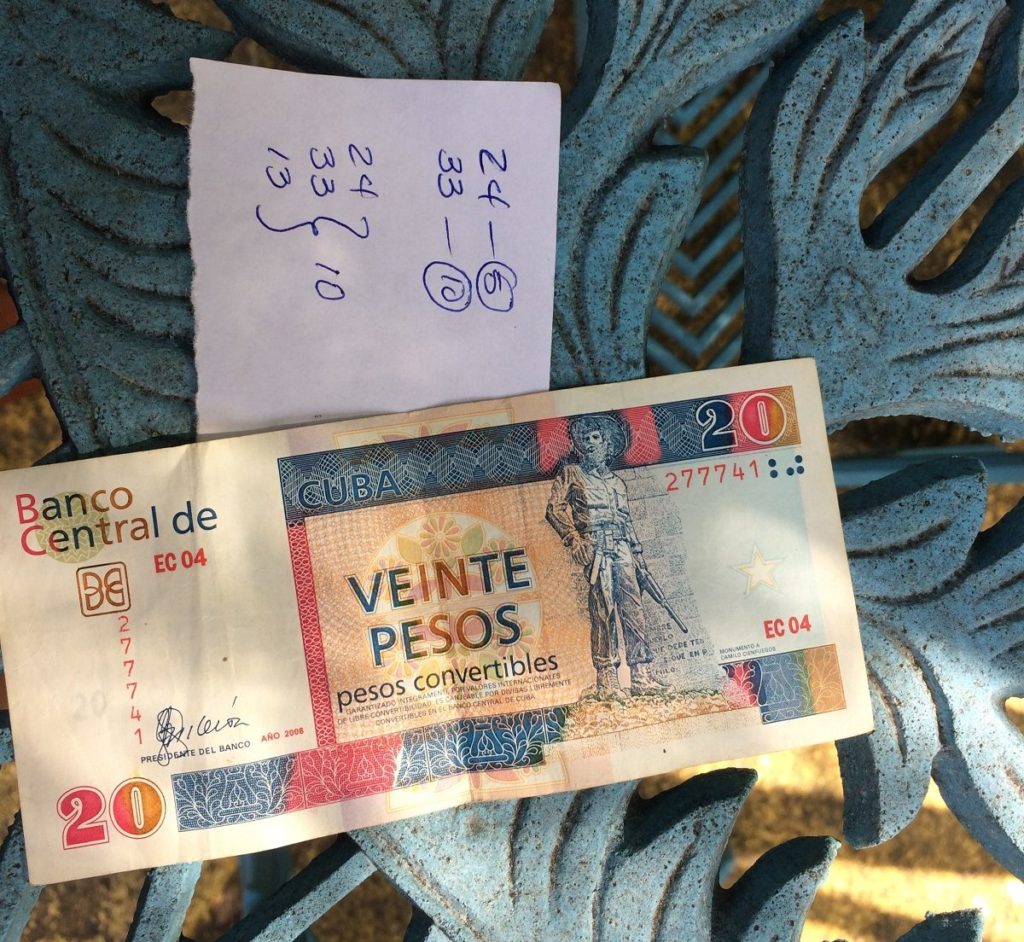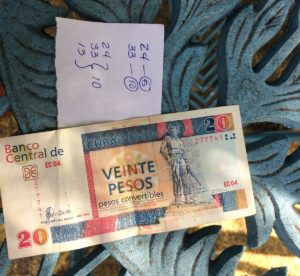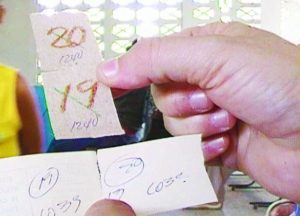 “LA BOLITA EN CUBA”, ES ILEGAL PERO POCOS SE RESISTEN.
“LA BOLITA EN CUBA”, ES ILEGAL PERO POCOS SE RESISTEN.
¿Qué habrán tirado?, se preguntan diariamente muchos en toda Cuba, donde aguardan con esperanzas a tener suerte en el juego de la bolita
En Cuba, la lotería se inició a principios del siglo XIX. Cuando llegaron los emigrados chinos difundieron la primera charada en la que los números se representaban con animales u objetos. Por esto, se le empezó a llamar “el juego del bicho”.
A Mamaíta, natural de Asturias y residente por muchos años en Puerta de Golpe, provincia de Pinar del Río, le costaba leer y escribir español. Sin embargo, se sabía cada número con sus múltiples significados de memoria. “Su número era el 9 y aunque no jugaba siempre, le decía a alguna amistad que lo tuviera presente para tal día. Y no fallaba”.
… Cerca de la Esquina de Tejas vive William, en una casa divida con su hermana. “Universidad para todos”, le dice ella cuando lo ve en la mesa con tantas tablas y libretas. “Ni para la escuela fue tan consciente. Ahora saca mejor las cuentas que cualquier matemático”.
−Tata, tu regalo este año sí va. Voy por 20 pesos para tu edad, el día del cumpleaños y el 49, que es borracho, porque tú llevas rato hablando de fiesta −afirma William.
Enseguida guardó la hoja, levantó el teléfono para llamar al listero y le dijo de carretilla cómo iban las apuestas. “Aunque es ilegal en Cuba juega casi todo el mundo, es por vicio. El que no apuesta habitual, cuando se le asfixia el bolsillo, un día al menos pone un pesito. Yo conozco quienes se lo ganan sin tener ni idea, y la conversión es 70 CUP con 100 CUP que cojas el número, te haces millonario”, añade.
Quien esta en Control del Juego.
En la actualidad, los banqueros llevan el control del negocio pero a ellos nadie los conoce. En caso de que los capturaran podrían aplicarle el artículo 219.1 del Código Penal que advierte: “El banquero, colector, apuntador o promotor de juegos ilícitos es sancionado con privación de libertad de 1 a 3 años o multas de 300 a 100 cuotas o ambas”. Además de la posible expropiación de bienes y dinero que hayan acumulado.
“Lo mío es anotar”, aclara un “listero” que prefirió el anonimato. “Por cada entrega gano el 25 por ciento y con eso me alcanza para vivir. Mi clientela no falla. Esa gente le pone más de cinco pesos diarios a varias opciones. Pero no me muevo de mi zona. Te embarcas si vas a otros lugares. Se te tira la policía y ahí mismo se acabó la historia. Tampoco fío, por eso no te tenido problemas”.
− ¿Cómo saber que salió? La gente siempre se enteran: por el radio, la antena y ahora el Internet. Luego se llama a todo el mundo y llega hasta Oriente. Se anota por la mañana y el tiro sale al mediodía. El de la tarde es de 5:00 a 6:00.
En un aula de preuniversitario a medida que la profe pasa asistencia a los alumnos, hay un muchacho que repite de memoria el lenguaje de la “lotería cubana”. Se ríe a diario de su compañera, el número 37: bruja. Él fue gallo en décimo grado, después ramera y ahora niño grande: la escaleta del 11 al 13.
“Yo no juego, pero mi mamá cada vez que tiene un chance lo hace. La mayoría de las veces se empata con la verdad y le entra dinero a la casa”, explica. De ahí aprendió el significado de los números.
Por vicio o necesidad en la mayor de las Antillas, sin cartones o décimos, igual se vive la ilusión de ganar la lotería. Aunque nadie conoce a alguien que se hayan hecho millonario aceptando con los números, aquí muchos esperan que cante el banquero, o que se actualicen las páginas de Internet para saber si este mes “llegó un milagro”.
 LA BOLITA EN CUBA” IS ILLEGAL BUT FEW RESIST.
LA BOLITA EN CUBA” IS ILLEGAL BUT FEW RESIST.
What will they have thrown? Many people ask daily throughout Cuba, where they wait with hope for luck in the game of the ball.
In Cuba, the lottery began in the early 19th century. When the Chinese emigrants arrived they spread the first charade in which the numbers were represented with animals or objects. For this reason, it was called “the game of the bug.”
Mamaíta, a native of Asturias and resident for many years in Puerta de Golpe, Pinar del Río province, found it difficult to read and write Spanish. However, each number was known for its multiple memory meanings. “His number was 9 and although he didn’t always play, he would tell a friend to keep him in mind for that day. And it did not fail ”.
… Near the Corner of Texas William lives, in a house divided with his sister. “University for everyone,” she says when she sees him at the table with so many tables and notebooks. “Not even for school was he so conscious. Now he scores better than any mathematician. ”
-Tata, your gift this year does go. I’m going for 20 pesos for your age, the day of the birthday and the 49, which is drunk, because you have been talking about a party for a while – says William.
He immediately put the sheet away, picked up the phone to call the list, and told him by wheelbarrow how the bets were going. “Although it is illegal in Cuba almost everyone plays, it is because of vice. He who does not bet regularly, when his pocket suffocates, one day at least puts a pesito. I know those who earn it without having a clue, and the conversion is 70 CUP with 100 CUP taking the number, you become a millionaire, “he adds.
Who is in control of the Game.
Bankers are currently in control of the business, but no one knows them. In the event that they were captured, they could apply article 219.1 of the Penal Code that warns: “The banker, collector, prompter or promoter of illegal games is punished with deprivation of freedom for 1 to 3 years or fines of 300 to 100 fees or both”. In addition to the possible expropriation of assets and money that they have accumulated.
“My thing is to write down,” clarifies a “list” who preferred anonymity. “For each delivery, I earn 25 percent and with that, I have enough to live on. My clientele does not fail. These people put more than five pesos a day on various options. But I don’t move from my area. You embark if you go to other places. The police shoot you and the story is over right there. I don’t trust either, that’s why he didn’t have problems for you ”.
– How do you know it came out? People always find out: through the radio, the antenna and now the Internet. Then everyone is called and reaches the East. It is written down in the morning and the shot comes out at noon. The one in the afternoon is from 5:00 to 6:00.
In a pre-university classroom, as the teacher assists the students, there is a boy who repeats from memory the language of the “Cuban lottery”. He laughs daily at his partner, number 37: witch. He was a tenth-grade rooster, then a harlot and now a big boy: the ladder from 11 to 13.
“I don’t play, but my mom does it every time she has a chance. Most of the time it is tied to the truth and money enter the house ”, he explains. From there he learned the meaning of numbers.
By vice or necessity in the largest of the Antilles, without cards or tenths, the illusion of winning the lottery is lived. Although no one knows someone who has become a millionaire by accepting the numbers, many here expect the banker to sing, or the Internet pages to be updated to find out if this month “a miracle arrived.”
Agencies/ CubaComenta/ Vladia R. García/ Extractos/ Excerpts/ Internet Photos/ Arnoldo Varona/ www.TheCubanHistory.com
THE CUBAN HISTORY, HOLLYWOOD.












